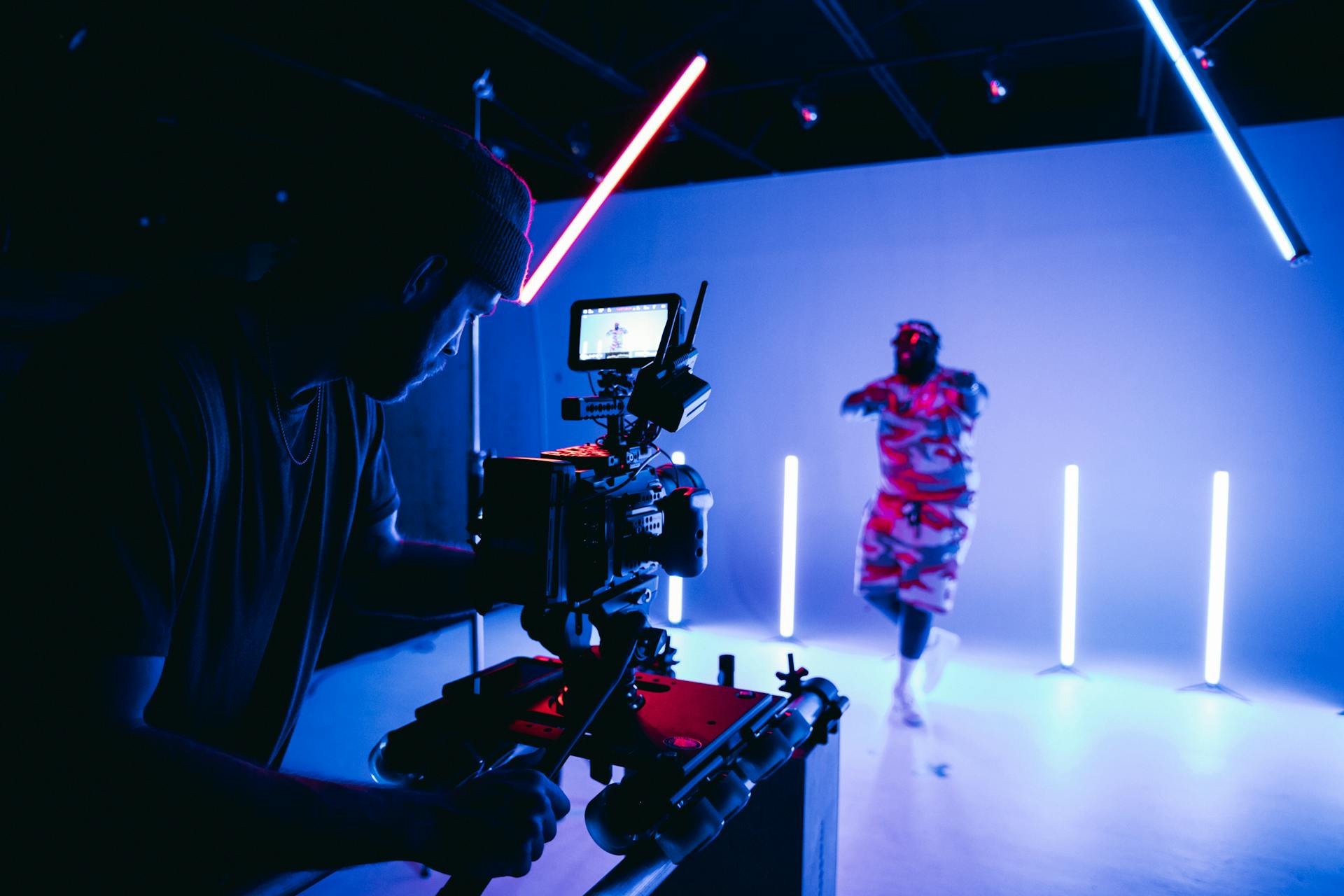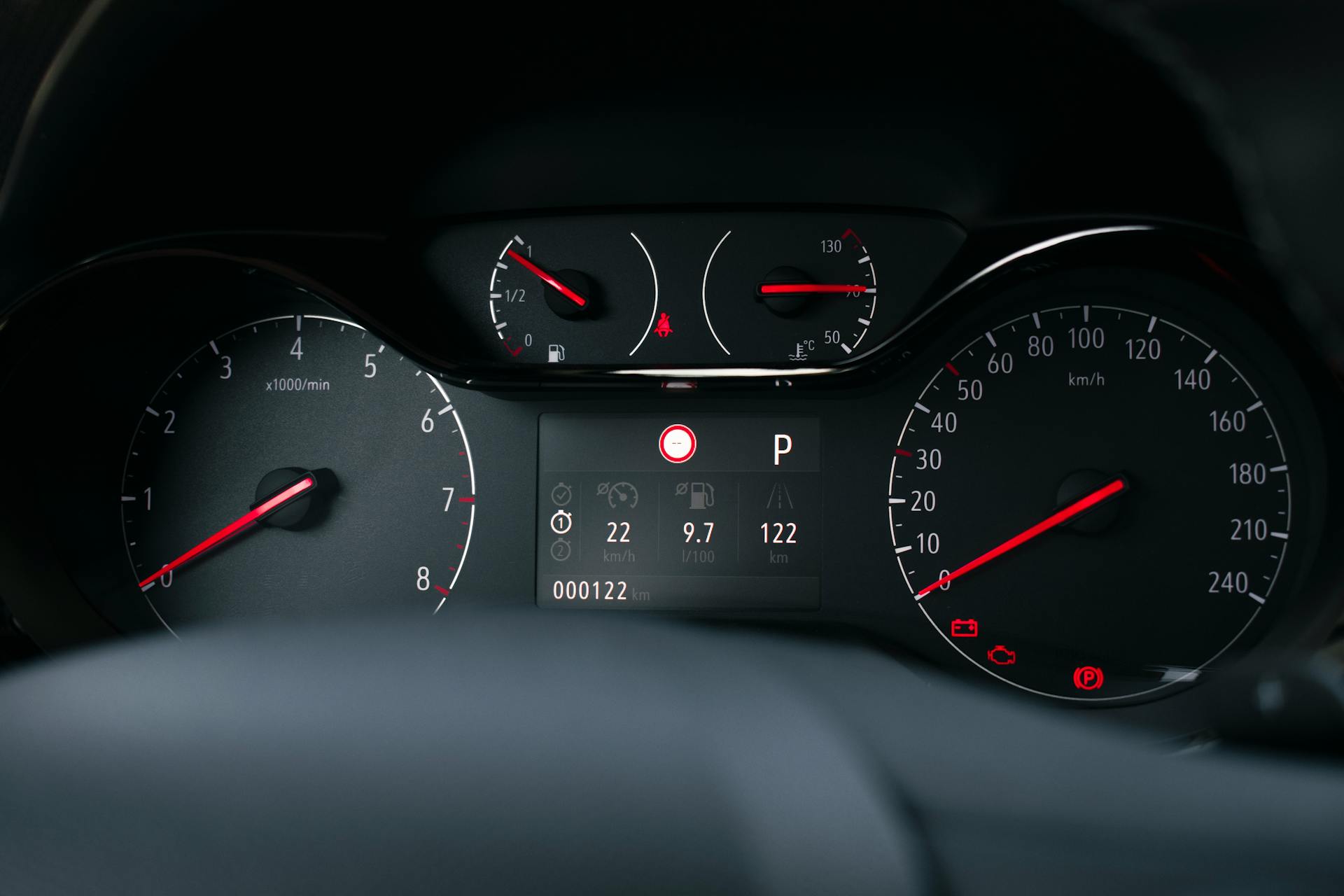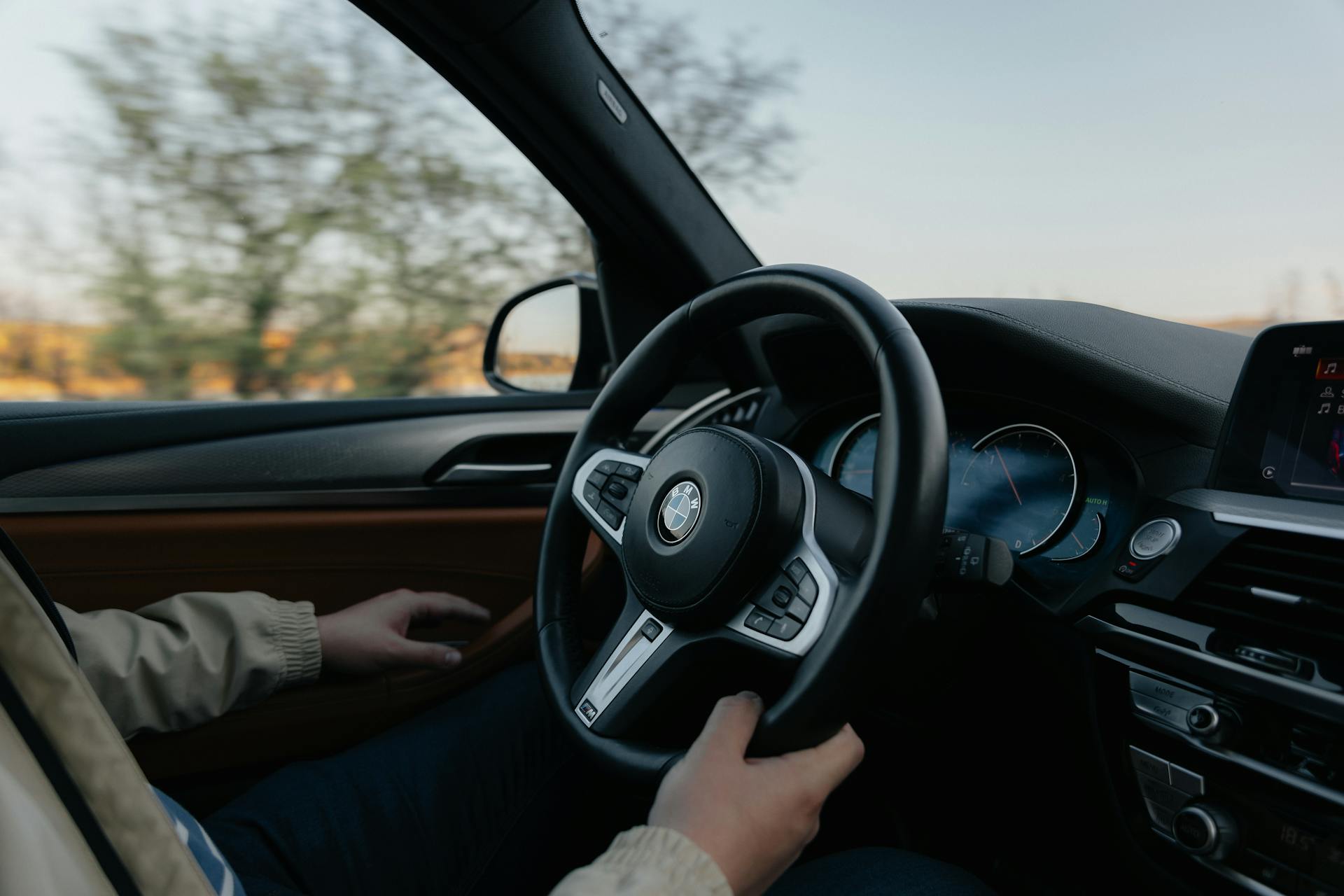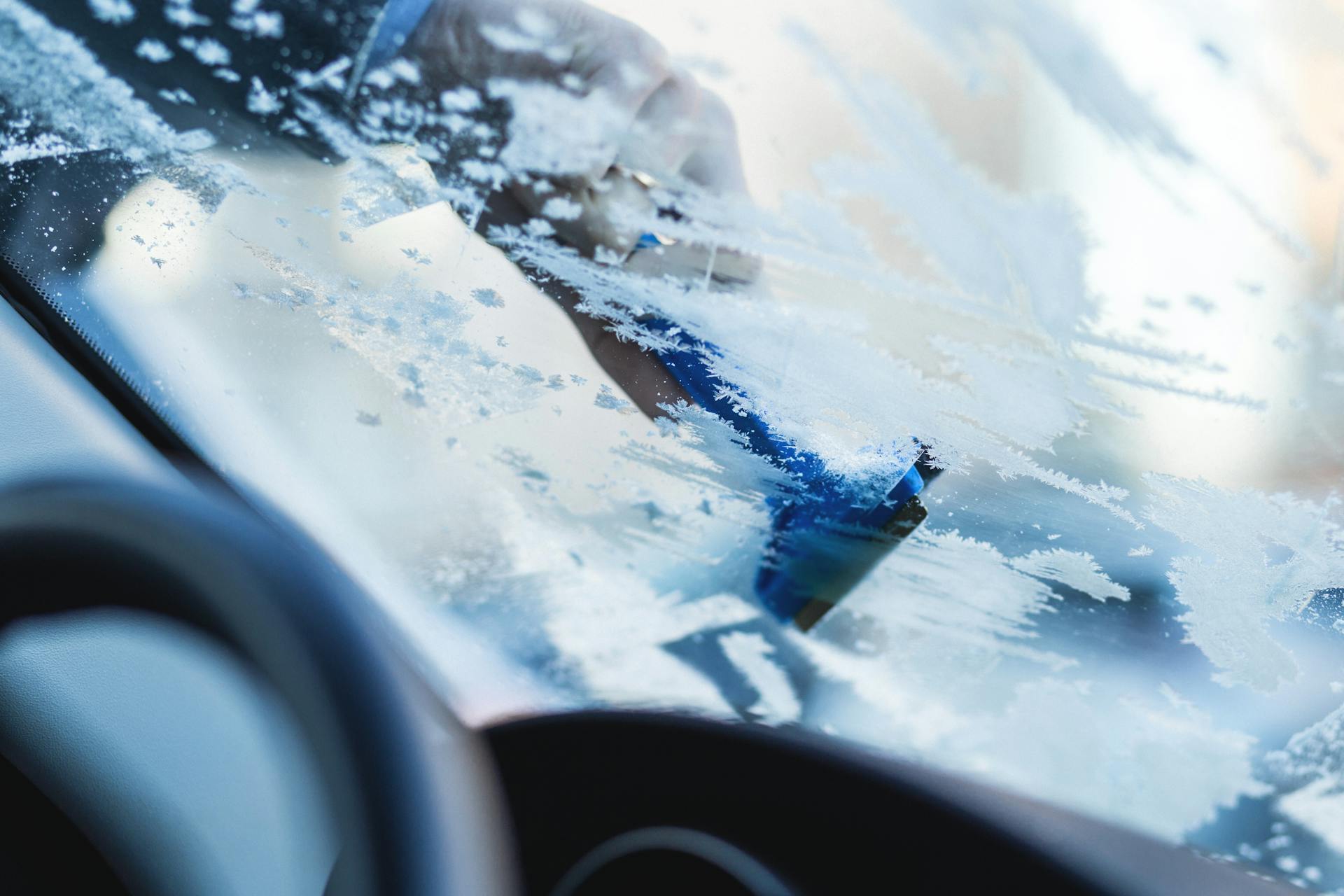
The Aukey Dash Cam Dual is an excellent choice for anyone looking to upgrade their driving safety. It features dual-channel recording, which allows you to capture both the front and rear of your vehicle simultaneously.
This feature is particularly useful for larger vehicles or those with trailers, as it provides a more comprehensive view of the surroundings. The camera's wide-angle lens and high-resolution sensors work together to provide a clear and detailed image.
The Aukey Dash Cam Dual is also equipped with Wi-Fi connectivity, making it easy to transfer and share footage from your smartphone. This feature is especially convenient for filing insurance claims or sharing evidence with the authorities.
With its compact design and discreet installation, the Aukey Dash Cam Dual is a great addition to any vehicle.
Additional reading: Dash Cam Aukey
Pros and Cons
The Aukey Dash Cam Dual has its share of advantages and disadvantages. One of the main pros is that it captures excellent day and night video.
Its secondary camera can also be used for capturing interior or rear window views, which is a convenient feature. You can even use it for parking mode, keeping an eye on your vehicle when you're not around.
On the other hand, the dash cam could use a longer-running capacitor, which might be a drawback for some users. Additionally, GPS is not included in the standard package and costs $20 as an external add-on.
Pros
The product's pros are definitely worth mentioning.
The day and night video captures are excellent, making it perfect for capturing footage both during the day and at night.
The secondary camera can be used for interior or rear window captures, giving you more flexibility with your setup.
Installing and using this product is easy, which is a huge plus in my book.
Cons
The Cons of the device are worth considering. One major drawback is that the capacitor could use a longer running time to improve overall performance.
A GPS feature is not included in the standard package, and if you need it, you'll have to shell out an extra $20 for an external add-on.
The device's design could be improved with a more efficient capacitor, which would likely enhance its overall functionality.
Design and Features
The Aukey dash cam dual has a sleek and functional design that sets it apart from other models. It features a vertically oriented design that leaves room for four easy-access buttons beneath the display, making it a breeze to use.
The display itself is a sharp 960x240, 2-inch color model that provides clear and crisp visuals. The front 1080p camera has a 170-degree field-of-view, while the interior/rear 1080p camera has a 152-degree field-of-view.
The Aukey DRS2 dual-channel camera is a standout feature, with a silver secondary camera that can be used as an interior or rear camera. This camera can be toggled between grayscale and color captures, making it perfect for interior night use with infrared.
The camera system is simple and easy to navigate, with a display that shows the current function of the buttons below it. One unusual function to know about is changing the rear camera capture mode from grayscale to color.
You might enjoy: Race Dash Display
The Aukey DRS2 is warrantied for a full two years, which is unusually lengthy in the dash cam field. It's also rated to operate from minus 13 degrees to plus 149 degrees Fahrenheit, making it perfect for use in a variety of environments.
Here are the key features of the Aukey DRS2:
- Dual 1080P Cameras
- Intellgent Operation
- Enhanced Night Vision with IR Sensor and Dual IR LED Lights
- Detachable second camera
- G-sensor-activated Emergency Recording
- Loop Recording
- Time-Lapse Recording
- Emergency Recording
- microSD Card: Class 10 or higher, 128GB Max
Performance and Specs
The Aukey DR03 dual dash cam takes excellent 1080p video, both day and night, with good color saturation and easily discernible details.
The camera's secondary lens captures video of similar quality to the front camera, and it even deals well with direct sunlight. This is a great feature for capturing events through your rear window.
The dash cam uses a supercapacitor for impeccable performance in temperatures ranging from -20°C – 65°C, making it suitable for use in various climates.
Here are some key specs of the Aukey DR03:
- Image Sensor: Sony Exmor IMX323 2.19-megapixel CMOS sensor
- Angle of View: Front camera – 170°, Rear camera – 160°
- Recording Resolutions: 1080p
- Recording Modes: Loop, Motion Detection, Time-Lapse, and Emergency Recording
- microSD Card: Class 10 or higher, 128GB Max
- Operating Temperature: -30°C – 75°C / -22°F – 167°F
The camera's G-sensor-activated Emergency Recording feature automatically captures unexpected driving incidents and protects the recordings from being recorded over, which is a must-have feature for any dash cam.
Performance
The DRS2 takes excellent 1080p video, both day and night. In fact, it's night video is even better than the Vantrue X4's 2160p night video.
The DRS2's daytime video is also top-notch, with the rear camera video being nearly identical to the front camera video in color mode. It also demands a lot less storage than 2160p video.
You can see from the front capture that the DRS2 takes excellent video, with clear details and good color saturation. The interior camera mounted on the rear window also takes video of similar quality.
The secondary camera mounted in the rear takes video that's about the same quality as the front's, and it does well with direct sunlight. The video is clear and detailed, even in challenging lighting conditions.
Night captures are actually as good as I've seen, thanks to the infrared lights on either side of the lens. However, headlight flare can be a bit more pronounced than with some other cameras.
Interior night video shows a lot of detail, thanks to the infrared lights, and you'll even get decent coverage of events through your rear window with the secondary camera mounted inside.
Camera Specs
The camera specs of the dash cams we've reviewed are quite impressive. The AUKEY 1080p Front and Rear Dual Dash Cam, for example, features a Sony Exmor IMX323 2.19-megapixel CMOS sensor.
The DRS2 takes excellent 1080p video, both day and night, with good color saturation and details easily discernible. The rear camera video is nearly identical to the front camera's when in color mode, with slightly less fish-eye.
Here are the camera specs of some popular dash cams:
The AUKEY DRS2, for instance, has a 170° front field of view and a 152° rear field of view, allowing for full road coverage. The DRS2 also features a G-sensor that automatically triggers protected recordings to capture unexpected incidents.
Installation and Setup
Installing the Aukey dash cam is a relatively straightforward process, but it's not entirely familiar if you're new to installing car equipment.
The first step is to replace the gray tape, which is an optional step. After that, you'll need to insert the SD card and prep the area where the dash cam will be mounted.
The installation process involves several steps, including mounting the dash cam, plugging in the power cable, and running the cable through the headliner and A-pillar. You'll also need to feed the power cable behind the glove box and bring it forward to plug in the power adapter.
Here's a simplified list of the installation steps:
- Replace gray tape (optional)
- Insert SD Card
- Prep the Area
- Prep the dashcam
- Mount the dashcam
- Plugin power cable
- Run power cable in headliner
- Run power cable down A-pillar
- Run cable behind the glove box
- Feed power cable behind glove box
- Bring cable forward
- Plugin power adapter
- Tidy up cable
After completing the installation, you'll need to power up the dash cam and go through the initialization process, which includes choosing a language and setting the date and time.
Installation
Installing a dashcam like the Aukey can seem daunting, but it's actually a fairly straightforward process.
First, you may need to replace the gray tape that's holding the camera in place during shipping, this is an optional step.
You'll then need to insert the SD card into the camera.
Before mounting the camera, make sure to prep the area by clearing any obstructions and choosing a suitable location.

The next step is to prep the dashcam itself, this includes attaching any additional parts such as the second camera.
Mount the dashcam in the chosen location, making sure it's secure and won't obstruct your view.
Next, you'll need to plug in the power cable and run it through the headliner.
The power cable then needs to be run down the A-pillar, this is where things can get a bit tricky, so take your time.
Once you've run the cable behind the glove box, you'll need to feed it through to the other side.
Finally, bring the cable forward and plug in the power adapter, this is the final step before tidying up the cable.
Here's a step-by-step guide to the installation process:
- Replace gray tape (optional)
- Insert SD Card
- Prep the Area
- Prep the dashcam
- Mount the dashcam
- Plugin power cable
- Run power cable in headliner
- Run power cable down A-pillar
- Run cable behind the glove box
- Feed power cable behind glove box
- Bring cable forward
- Plugin power adapter
- Tidy up cable
- Done – almost
- Second camera placement
Initialization
Initialization is a breeze with the DRS2 dashcam. Turning on the car will automatically power up the camera.
The first screen asks you to choose a language and then enter the date and time. This is a quick and straightforward process.

If you forgot to format the micro SD card, like I did, you'll be prompted to do so, which only takes a few seconds to complete.
The 2-inch screen may be small, but the text and menu icons are sharp and crisp, making it easy to navigate through all the settings.
The menu layout and button configuration are intuitive and easy to use, even with small buttons. The first button takes you to the previous menu, and the up and down arrow buttons do exactly what you expect.
The OK button performs an Enter or Confirm function, which is helpful when navigating the menu. You can also hit the back button until you leave the menu or let it idle out.
Consider reading: Small Dash Cam
Frequently Asked Questions
Should I get a single or dual dash cam?
For optimal coverage, consider a dual dash cam that records both front and rear views simultaneously. This provides more comprehensive evidence in case of an incident.
How do I turn on my Aukey dash cam?
To turn on your Aukey dash cam, simply plug in the car charger and connect the included cable to the device. Then, insert a Micro SD Card and follow the on-screen instructions to complete the setup.
Do dashcams connect to your phone?
Yes, Wi-Fi enabled dashcams connect directly to your smartphone or tablet, allowing you to control and access your footage remotely. This convenient connection is made possible through a dedicated app.
How does a dual dash cam work?
A dual dash cam has two cameras, one facing forward and the other inward, providing comprehensive coverage of the road and cabin. This setup allows for a more complete and accurate recording of events.
Sources
- https://www.swaggermagazine.com/home/product/aukey-drs2-detachable-dual-dash-cam/
- https://www.pcworld.com/article/398485/aukey-drs2-dual-dash-cam-review-excellent-video-in-all-directions-and-infrared-too.html
- https://cktechcheck.com/aukey-drs2-detachable-dash-cam-review-and-install-guide/
- https://jabbareviews.com/aukey-1080p-front-and-rear-dual-dash-cams-review/
- https://carcamcentral.com/review/best-budget-cameras-front-rear-dash-cams
Featured Images: pexels.com


